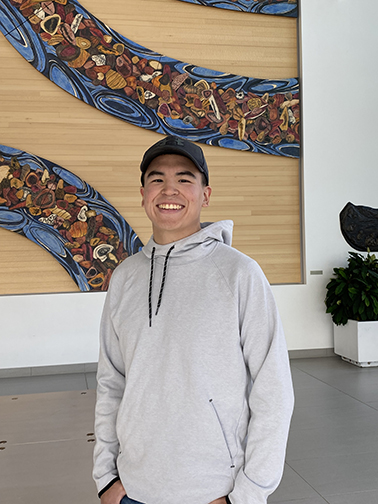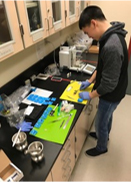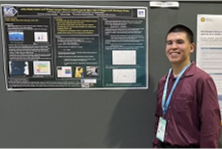BLaST celebrates September Scientist of the Month

Since 2016, the Biomedical Learning and Student Training (BLaST) program at UAF has highlighted scientists from all biomedical fields through its Scientist of the Month articles. UAF BLaST Scholar Orlin Gologergen was selected as the September BLaST Scientist of the Month.
Orlin Gologergen, of Siberian Yupik descent and a first-generation college student, is a UAF sophomore pursuing a bachelorÔÇÖs degree in biological sciences with a minor in marine science. Gologergen is a third-year BLaST Scholar from Savoonga, ‗‗‗¢┤½├¢. He was raised in Nome and attended Mt. Edgecumbe High School in Sitka. He previously was a BLaST Undergraduate Research Experience student at the University of ‗‗‗¢┤½├¢ Southeast (UAS) campus before attending UAF. Gologergen is interested in marine mammal health and ecology. His future goal is to pursue a M.S. degree in marine biology to further understand how toxins affect marine organisms.
Gologergen first started his research journey in the Cetacean-Human Interaction Lab at UAS Sitka campus led by Jan Straley, where he studied bowhead whale skin to explore turnover rates and diet. At UAF, Gologergen volunteered at the ‗‗‗¢┤½├¢ Department of Fish and Game in the spring of 2021 where he processed ice seals and whale stomachs in search of parasites. He also worked in the Fairbanks ‗‗‗¢┤½├¢ Stable Isotope Facility lab to expand his first study in Fall 2021-Spring 2022.
Gologergen presented at the 2018 Western ‗‗‗¢┤½├¢ Interdisciplinary Science Conference held in Nome, and the 24th biennial conference on the Biology of Marine Mammals held at Palm Beach, Florida in August 2022. Gologergen is joining the Marine Ecotoxicology and Trophic Assessment Laboratory (METAL) lab this fall to analyze bowhead whale skin for mercury concentrations.
Gologergen was a teaching assistant for BIOL 120: One Health Perspectives: Marine Mammals of ‗‗‗¢┤½├¢ course to the 2022 JumpStart Summer program held in June in Nome. He provided support to Ellen Chenoweth, a UAS faculty and BLaST Research, Advising and Mentoring Professional (RAMP). During the three-week course, Gologergen encouraged students to think critically about the course content. He continues to promote ‗‗‗¢┤½├¢ Native students in marine science and gives them tools to strengthen their ability to apply research oncology and pedagogy and how to involve their subsistence lifestyle into their academic research studies. Chenoweth adds, ÔÇ£He was very insightful helping me plan the course and assess how it was progressing. It was a joy to watch him patiently mentor younger students one-on-one.ÔÇØ

Gologergen would like to thank his BLaST RAMP, Emily Sousa; and Jan Straley, Lauren Wild, and Ellen Chenoweth at the UAS Sitka for their support and guidance into the first years of his academic and scientific career.
ÔÇ£I first met Ms. Jan Straley, Dr. Lauren Wild, and Dr. Ellen Chenoweth when I took a course at UAS Sitka during high school," Gologergen explained. "They taught practical applications of stable isotope analysis for studying diets. Taking this course started my passion for science, where I am truly grateful to have met great research and life mentors.ÔÇØ
Wild shared, ÔÇ£Orlin is a hard-working student, with great ambition. He is one of those students that really gets you excited about teaching and mentoring. I learned just as much from him as he did from me, and that is what makes him special.ÔÇØ
Gologergen also worked under former BLaST RAMP Andrew Cyr, who was instrumental in teaching him to process bowhead whale samples in the lab at UAF.
These BLaST Scientist of the Month articles are shared across all UAF and University of ‗‗‗¢┤½├¢ Southeast rural campuses and with BLaSTÔÇÖs partners: I─╝isa─ívik College, Fort Lewis College, Din├® College, Salish Kootenai College and ‗‗‗¢┤½├¢ Pacific University. For more BLaST Scientist of the Month highlights, visit

Biomedical Learning and Student Training (BLaST) is a NIH-funded UAF program that enhances capacity for undergraduate biomedical research training and efficacy for engaging students from diverse, especially rural ‗‗‗¢┤½├¢n, backgrounds in education and training for biomedical research careers. BLaST started in 2014 and continues to provide research opportunities for faculty, staff and students through its many workshops, curriculum, and research support.
Any questions about this article or any BLaST publications, please contact Amy Topkok.


